Book Reviews by Genre: Fiction
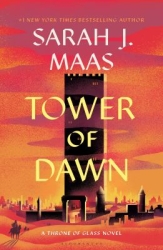
Tower of Dawn is the sixth book in the Throne of Glass series and focuses on Chaol Westfall and his journey to heal his legs and spine. This book takes a very different perspective from the previous books and introduces us into more of the political landscape from across the sea, which offers a fresh perspective on the series.
At the start, Chaol was one of my least favorite characters, but this book shows him in a more vulnerable and complex light that is makes him seem more relatable to the reader. His personal struggles add depth to his characters and makes me appreciate why Maas decided to have a book focused on him.
I chose to tandem read this book with Empire of Storms and I would highly recommend to put in the effort to tandem read. Since both books happen simultaneously, the way how timelines intertwine creates for a really complicated and beautifully written piece. The only reason it is rated 4 stars is because I do believe it drags on for a little bit, but it leads up to Kingdom of Ash perfectly.
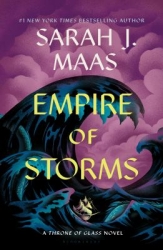
The fifth book in Throne of Glass, Empire of Storms, is a masterfully written book that builds up for an amazing edning to the series. The buildup is intense, and Sarah J. Maas has been creating complicated and interwoven plotlines since the beginning.
I chose to tandem read Empire of Storms alongside Tower of Dawn, the sixth book, which required dedication but was absolutely worth it. Experiencing both stories added depth to the overall narrative and enhanced my appreciation for the two books and how aligned they were.
In this book, Aelin Galathynius must rally allies for the looming war, and the stakes have never been higher. Maas has an incredible ability to immerse readers into her books. Her world-building is impeccable, and this book highlights how carefully she has been plotting this journey from the very start and when everything finally clicks into place, it leaves me in awe of her ability to craft such an intricate and amazing story.
Without a doubt, Empire of Storms is a strong contender for my favorite book in the series.
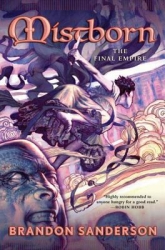
Rebellion in this world is impossible, the king is immortal, and the people are weak, but Kelsier is determined to make a change. Kelsier has a wild plan, Vin a street urchin, gets wound up in this plan. She realizes that this goes deeper than she thought, and that there is always another secret.
This is one of the first books by Brandon Sanderson I've read and it's magnificent. This fantasy book is one of the best I've read, with twists and turns in every chapter. The characters feel real because of their bonds with each other. This is definitely a book that explores relationships, magic, and rebellion.
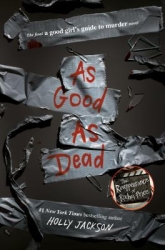
After the last investigation Pip is haunted by what events that transpired. She can't seem to escape the last investigation and with the death threats becoming more severe, she is left to solve this case. Pip thinks that this case will solve her, but this time the stakes are higher, and if she doesn't find out who this is she will disappear.
I think this book was truly amazing, Holly Jackson did a fantastic job explaining the effects of the last book (Good Girl, Bad Blood). The ending was dark and twisted. This is a great book for mystery lovers.
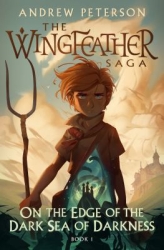
On the Edge of the Dark Sea of Darkness follows three siblings, Janner, Tink, and Leeli Igiby, as well as their trusty dog Nugget, as they live under the rule of Fangs of Dang, who oppress their peaceful village. The kids have always tried to stay on the Fangs' good side, but a series of events leads to the three kids' actions directly working against the Fangs of Dang, and now they must work with some new friends to keep their family together and safe.
If you enjoy world building, this book is for you. The author includes many in depth details about the new world, even if some details feel unnecessary. The author explains the significance of various animals, cultures, songs, and recipes that are completely unique to this world.
I felt some parts of this book, particularly the beginning, were slow as the author built the Igiby's world. The adventure doesn't really begin until a little before half way through the book. However, after finishing the rest of the series, the world building is necessary as this book leads into a 5 star series!
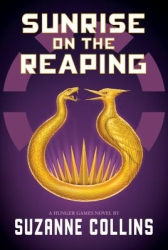
Sunrise on the Reaping follows Haymitch Abernathy and his experience in the Hunger Games, a reality TV show where kids must fight to the death. However, this specific round of Hunger Games has a special twist from the traditional Hunger Games. Due to this Hunger Games being the 50th annual Hunger Games, (also known as the second "Quarter Quell"), Haymitch must face twice as many opponents in his battle of survival.
I finished this book in two days! Even though Sunrise on the Reaping is a prequel and I already knew the outcome, Suzanne Collins still found ways to make the book compelling and interesting, with twists and turns that made this story completely unique. The story was not as predictable as I assumed it to be, which made for a very fun read!
Despite Sunrise on the Reaping being part of the overall Hunger Games series, you could read it as a stand alone without the other books in the series and still enjoy it. There are no dull moments, even from the very first page Collins is able to draw the reader into the world and keep the reader there until the very last page.
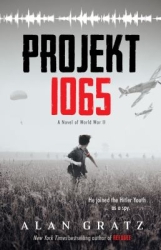
November 9th, 1938 was nicknamed the night of broken glass, and it was on this day that Michael’s eyes were opened to the horror that was the nazi’s. Shops were destroyed, Jews were beaten, killed, and arrested. Soon Michael discovers that his parents, the ambassadors for the Irish embassy in Berlin, are secretly collecting information for the allies against Germany. With his photographic memory and determination to bring justice to a Hitler ruled Germany, Michael will help with the cause however can even if it means becoming the most convincing nazi youth. He will uncover secrets that the nazi’s are hiding, that only he can prevent.
Projekt 1065 by award winning author Alan Gratz is a masterpiece in writing giving an accurate representation of World War 2. He shows the terrible truths of the time and the way the citizens were brainwashed in a captivating plot and immersive story. With perfect descriptions and thrilling plot twists you will be interested in the book the entire way through. This book is an example of an amazing historical fiction book, and I believe that many people will enjoy this novel.
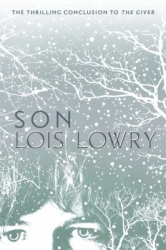
For those who want a story that is nothing short of enlightening, Lois Lowry’s “Son” is the book for you. The fourth and final book in the eye-opening “The Giver” series, the storylines of all the previous books are masterfully and artistically woven into a single thread. Claire, a Birthmother in her community, has her world turned upside down when her baby is taken from her. Now, she must embark on the journey of a lifetime to get him back — no matter what the price. In my humble opinion, this is one of the most fantastic books I have ever read. Being the last book in the series, it has the ability to cultivate an incredibly powerful and complex story that keeps readers heartstrings tied to the page. It’s got plot twists, evil and mysterious villains, amazing shows of strength, moments of joy, sadness, fear, and surprise, all while carrying one warm, loving message. If “Messenger” left you wanting for more, read “Son”. Trust me — it’s worth it.
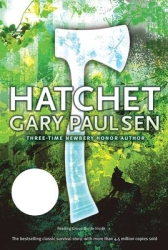
I first read this book for a school assignment, but quickly fell in love with the outstanding novel Hatchet, by Gary Paulsen. Hatchet is a perfect survival book for nature lovers. Paulsen writes about a boy named Brain Robeson. With parents divorced, and a secret eating him from the inside, Brian’s life is in turmoil; However, his life changes the moment his plane crashes in the Canadian wilderness on a flight to his father’s house. Can Brain survive, or will he succumb to the sheer power of nature? Hatchet is a top notch book and will please any reader.

Once already addicted to the previous two books of this series, the final book of the trio was a must have! Darth Bane: Dynasty of Evil keeps the readers on the edge of their seats! Bane has finally finished training his apprentice, Darth Zannah, in the ways of the Dark Side; However, she seems unwilling to take the title of master for her own. Bane must decide whether to wait longer for Zannah to overthrow him, or he much quickly choose a new apprentice. Which will he choose? Darth Bane, Dynasty of Evil is a perfect book for Star Wars fans, and is an epic ending to the Darth Bane Trilogy.
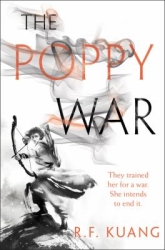
What initially drew me into The Poppy War was all the great things I had heard about the book and it's author R.F. Kuang. Fang Runin, the female main character, was both enjoyable and relatable at many times as she fought for a spot in Sinegard, the country's most elite military academy, in hopes of getting away from an arranged marriage. The book spans over a few years and eventually deals with some very intense and dark themes throughout the book. Kuang does not shy away from any details and makes the book feel incredibly real and allows a deeper connection with the character's emotions.
The pace of the book really picks up towards the second half, and I was constantly surprised where the story went next. The Poppy War is also very heavily inspired by Chinese folklore, but Kuang adds her own touch to the story, making the book seem very unique. I really enjoyed this book and is a definite five star for me.
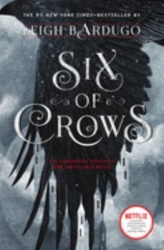
Six of Crows is the adventure of six characters, each with different backgrounds and different goals, sharing the same mission: accomplish a high risk heist from one of the most fortified cities in the world. Each of the members of the group have significant enemies, each trying to stop the heist from happening. There is constant action, and the book is impossible to put down. The author incorporates the character's background to form bonds within the group; highlighting their strengths and weaknesses together. There is never a dull moment, and the story is filled with twists and turns that aren't expected, but enhance the novel's plot. I would recommend if anyone is trying to get out of a reading slump, or find a book that will have you invested from start to finish.
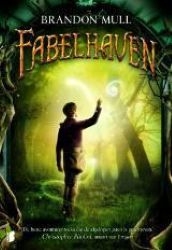
While the cover of Fablehaven, by Brandon Mull, may not be the most appealing, once the book is opened the reader is welcomed into a new, magical world, filled with sneaky satyrs, vain fairies, dangerous witches, and many more. Similarly, when Kendra and Seth are sent to their Grandfather's house for the summer, they don't expect to find an adventure waiting for them. A series of well-placed clues reveals a new, mysterious world to the two children, who must work to save it. Kendra and Seth make both friends and enemies in this preserve and learn the importance of following the rules, as well as risking them. Fablehaven was constantly surprising me, making it impossible to put down. The characters learn new things about what they are capable of accomplishing, which helps to inspire readers to reach outside of their comfort zone and discover what they can accomplish as well.
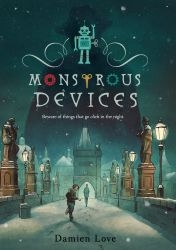
Before receiving what might have been the strangest gift ever, 12-year-old robot enthusiast Alex's life was already plagued enough with bullies and homework. But when he receives a toy robot from his enigmatic grandfather, along with a note that reads "This one is special," a sequence of supernatural events sets off around Alex, and right before things take a deadly turn, Alex's grandfather appears just in time to save his life...and pack him away in an impromptu snowy trip across Europe. As the two begin to unravel the mysteries behind the robot's magic, Alex finds himself becoming the main target of a group of mysterious assassins who follow his every move in the hopes of possessing his robot, and he is forced to battle villains of both human and robot form as he grapples with the immense, monstrous powers of his seemingly innocent toy.
Monstrous Devices is whimsical and unique, and although it is for middle-school aged children, the author is not afraid to add in some chilling, horror-adjacent plot points throughout the story (this novel literally begins with a murder scene...no more on that). While reading this book, I felt as if I was tagging along with Alex and his grandpa as they outwit the assassins; I could hear the robots the assassins used as weapons whizzing and whirring in their deadly attacks, and I could practically see the landscape this book is set in. The bits of history about robots and magic the author added in was also very intriguing, adding a mythical element to the story.
On the other hand, the ending of the book felt somewhat abrupt for me, and there were a lot of questions I had about the characters and the plot that were left unanswered. The lore behind the robot, and even Alex and his grandpa's own backstories, were a little hard to follow, and I ended up somewhat dissatisfied with the lack of conclusions the author gave. The characterizations of the assassins only left more questions, their motives were very unclear, and their eventual fate did not sit quite right with me. I do, however, know that there is a sequel to this book, and I hope that it will tie together some of the unresolved tensions.
In the end, even though it has its flaws, Monstrous Devices remains a magical and entertaining read that young readers will surely enjoy.
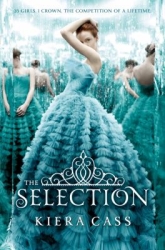
In a distant future, the US has fallen after a devastating sequence of wars, and in its place rises a new nation by the name of Illéa. The country is led by a traditional monarchy, and society is divided into castes, with Ones (royals, elites) lying at the top of the pyramid and the lowly Eights (handicaps, homeless people, orphans etc.) at the bottom, ostracized and left to suffer at the hands of society. As a form of entertainment or tradition, when the King and Queen's male progeny comes of age, the government televises a show known as the Selection, which centers around thirty-five young girls of all different castes compete on national TV for the hand in marriage of the prince.
America Singer is a Five; she's an artist, a singer, like her last name suggests. For her, the prospect of entering in the Selection is nothing but a nightmare, as it threatens her budding relationship with Aspen, who is a caste below her. But after continuous persuasion and bribes from her mother, she decides to compete anyway and finds herself in the presence of Maxon, the young prince of the realm that thirty-four other girls are desperate to win the favor of. Slowly, America begins to fall for him, questioning her own desires.
I had first decided to pick up this book as I thought the concept of a futuristic caste system and a monarchy was very interesting. These types of books were also not ones that I would usually read, so I thought it would be nice to try something different for once. The Selection, for all of its simple and predictable plot structure, is a fairly easy and somewhat entertaining read; I finished the first book in two days! However, that's where the compliments stop. The book overuses too many common YA book tropes (enemies to lovers, love triangles) as well as basic, shallow character archetypes (feisty female main character, dreamy and sweet main love interest, bubbly best friend, superficial mean girls, etc). As mentioned before, the plot has barely any depth, and the mentions of rebel attacks on the royal family and the corrupted caste system seem like a low-quality effort to retain the dystopian aspect of the novel at best. Romance plays itself as the main focus of the novel, and while that is not necessarily bad, it does tend get extremely repetitive as much of the novel and even the whole series centers around America deciding whether or not she really loves Maxon (as well as vice versa). And as for the characters themselves, I found both America and Maxon insufferable and one-dimensional. The book lacks tension and is overall very plain.
I did manage to get through the entirety of the series; however, I do not recommend this book to anyone interested in novels with a blend of romance and dystopian/fantasy elements. There are books out there that execute these genres better than the Selection in my opinion.
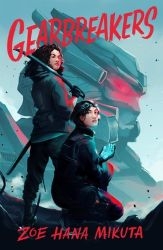
Two queer Asian girls, on different sides of the war. When their paths collide, at first, they are each other's enemy until they both realize they're fighting for the same purpose, and with a tyrannical rule spreading they have to work together to rebel.
This book was amazing, definitely worth reading. This book was full of action, sci fi and romance. This is one of the most underrated books and deserves more recognition.
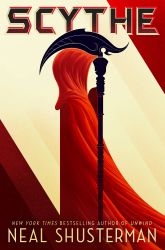
The Thunderhead, an all-knowing artificial intelligence was able to solve all of the world's problems, it could even bring back the newly deceased from the dead. Religion, creativity, hard work, and passion are obsolete, and jobs only exist to give people something to do. Everything is perfect, every accommodation is met, anyone can speak to the Thunderhead, and the Thunderhead can solve anyone's problems. However, because the Thunderhead’s purpose is to help humanity it vowed to have nothing to do with the problem of overpopulation and the humans would have to create that system.
The Scythedom is an organization of people whose job is to glean (or cause the permanent death of an individual). Scythes are treated with the highest honor and have to pay for nothing and wait for no lines, but they carry the tough burden of ending other people’s lives. Every scythe must meet a quota and must follow a list of rules. However, even with great respect no man-made thing is perfect and the drive for power may corrupt the Scythedom.
Citra and Rowan end up as apprentices for a scythe and they will soon learn the guilt and hardship of the job. Only one of them will become a scythe, they must learn and train constantly leaving their old lives behind. Through many plot twists the pair must do what they can to navigate their new environment. How will the other scythes react to a scythe having two apprentices? How will Citra and Rowan change?
Neal Shusterman’s Scythe is an amazing book. It portrays the mental toll and thoughts of the protagonists perfectly and demonstrates their character development amazingly. The world-building is immaculate, and the vocabulary and characters get you immersed in the book quickly. Every detail is looked over and every character is thought out thoroughly, all having unique backstories and different approaches and thoughts to the world around them.
Scythe is also a philosophical masterpiece and touches on subjects like the drive for power and corruption in society. Throughout the book I was thinking constantly and wondering about how the society works. I recommend this book to everybody for its thorough story and how it brings up many deep questions in a unique, subtle, and phenomenal way.
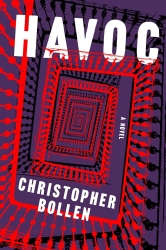
As a reader, do you gravitate towards relate-able, conventional, sweet narrators and stories that follow a comforting and predictable arc, ending in the literary version of “All is well”? If so, then read no further. Christopher Bollen’s page-turning, stomach-churning, prediction-spurning Havoc is not the novel for you.
Bollen’s sole narrator is octogenarian Maggie Burkhardt, a Wisconsin expatriate in Egypt during the pandemic, and Bollen’s use of the first person pays satisfying homage to its origin as an “unreliable narrator.” The book’s synopsis gives us a strong nudge in the “be wary of this narrator” direction, but it also complicates matters by adding an 8-year-old boy, arriving at the shabby-chic hotel on the edge of the Nile in the Sahara Desert with his harried mother, who quickly morphs into an unsettling and eerie nemesis for Maggie.
The peripatetic, well-heeled guests, Ben and Zachary, an American gay couple whom Maggie has befriended and feels comfortable with, as well as Ahmed, the local hotel manager with the proverbial heart of gold, who has warmly welcomed Maggie since her arrival from a mysteriously swift departure from Switzerland, provide rich and believable layers of characterization and sub-plots that robustly deliver from start to finish. But there’s never a doubt that Maggie is the axis around which this beguilingly straightforward yet actually quite twisty plot revolves.
While busying herself with ruminations about which guests might need her special “help” in overturning their lives for the good (ahem)—something Bollen makes sure that readers know is not a newly developed habit--Maggie tries and, to her astonishment, spectacularly fails to befriend young Otto. Subsequently, she becomes convinced that the precocious and troubled 8-year-old, who has quickly inserted himself into the homey interpersonal fabric of the sprawling and laid-back hotel, is on to her. As it happens, she may be right.
Bollen skillfully lays a crumb trail for readers—though never too many crumbs at once!—to suss out and/or add puzzlement to Maggie’s history and motives. Was Maggie’s long-time marriage to Peter who predeceased her as perfect as she recounts? And what’s going on with their daughter who appears in brief, hazy recollections as both a child and an adult when “she died”? The uneasy pleasure of this novel rests in the interwoven nature of Maggie’s unreliable memory and self-talk with the disturbing and escalating aspect of her and Otto’s game of one-up-man-ship. Is Maggie right about her suspicions of this child? Is the kid, in this case, “all right” or….decidedly not? And when friendly Ahmed finally cools towards Maggie because he’s heard just one too many contradictions in her back-story, should we feel pity for someone whose sanity is unraveling or a fervent hope that she be caught out before something worse happens?
The answers to these questions may possibly differ for every reader. But the staggering conclusion, rendered with an admirable combination of nail-shredding suspense and gut-punching abruptness, seemed worthy of Poe to this reader. Kudos to Bollen on his rendition of a “tale of mystery and imagination!”
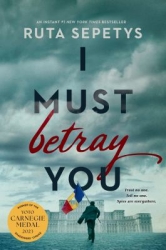
Christian is living in terrible conditions inside of communist Romania, and as the citizens of surrounding countries revolt for a change of government Christian might house the power to alert everyone not directly involved. Every day he is starving, tired, and paranoid, every Romanian is being watched, and any secrets will be uncovered. Soon his whole world is forced to change when he is pulled out of school and has to make a deal to preserve his family's lives. I Must Betray You by Ruta Sepetys Is a beautifully crafted story with an eye-opening plot. It has unique insights and a variety of interesting characters. Every chapter is equally as impressive with a storyline that keeps you reading. I Must Betray You is an amazing historical fiction book that I recommend to everyone.
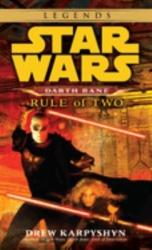
After getting a taste of the raw thrills provided by Drew Karpyshyn’s first novel, Darth Bane: Rule of Two was a must-have! Now having destroyed the Brotherhood of Darkness, Bane must find a suitable apprentice to carry on the power of the Dark Side; His choice: a little girl called Rain who, despite her size, is immensely powerful in the dark side. Bane must struggle to trust his choice of an apprentice, for the future of the Sith relies on it, while Rain must prove that she is worthy of the title of a master. With a similar mix of action as the previous book, this novel also incorporates an integral struggle, making it even more interesting. Darth Bane: Rule of Two will certainly have your hyperdrive engines ready to boost to the third and final book of the series!
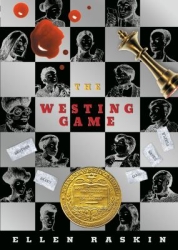
When smoke emerges from the house of the wealthy Samuel W. Westing and he is found dead, his sixteen heirs are invited to the reading of his will. Soon they will find themselves involved in a game to win his fortune, divided into pairs they must use nonsensical clues to win the game. No one is able to trust any of the other heirs, so when a huge snowstorm traps some of them together tensions are high. With unexpected twists in every corner of the book Ellen Raskin’s The Westing Game is a must read for any mystery lover. Every character is crafted brilliantly, with unique backstories and great character development. This book keeps you on your toes the whole time, with great vocabulary and a unique plot it is a one-of-a-kind masterpiece. The Westing Game is a perfect mystery novel for people of many ages and keeps you wanting more.
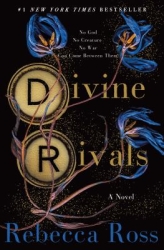
Divine Rivals is an enchanting novel that surpassed my expectations. The writing is magical and quickly captured my attention. It’s about Roman and Iris who work together as journalists in the fantasy town of Oath competing with each other for a promotion. A war between gods rages on in the distance—a war that Iris’s brother left to fight in. Because of a magical connection, the letters which Iris writes to her brother have made their way to Roman who one day decides to write her back, but she doesn’t know that the boy she connects with over those letters is actually her rival.
In Divine Rivals, you’ll hear the clicking of a typewriter. You’ll feel the slight bumps of the train you’re on. You’ll see the perilous front lines of a dangerous war. You’ll taste the warm tea the characters are sipping. You’ll smell the ink still fresh on the paper of a newly delivered love letter. The book is a special mix of happy, cozy moments as well as terrifying, heart-racing ones.
I absolutely loved the relationships between Iris and Roman. Their banter is so fun to watch, and every moment between them was electric. I never wanted them to be apart because the book was so much better when they were together. The other characters were interesting enough, but none of them really caught my attention.
The beginning of the book didn’t feel much like a fantasy, it was more like a made up town in the past. While I loved that setting in Oath, it did make some of the fantasy aspects kind of strange because I would forget that I was reading a fantasy. As well as that, the myths and lore of the war tended to bore me because I didn’t care about that as much as I did the two main characters. However, as the book progressed, it dove into the fantasy much more, and I really enjoyed it. I thought the pacing was pretty good and even in the moments where not as much was happening, I was still very invested.
Overall, the book is not without its flaws, but it’s still an excellent read. I loved the settings, the writing, and the main characters a lot!
Reviewer Grade: 10
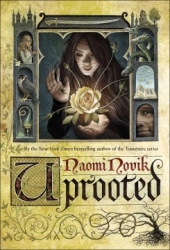
One of my first experiences with the writing of Naomi Novik was with Spinning Silver . This Rumpelstiltskin retelling was quite interesting and complex compared to the original fairy tale it was based on. Realizing this was the second in a “series” (of which I’m using this term loosely), I eventually sought this book’s predecessor. Uprooted seems to be an adaptation of eastern European folktales, but with more of the romance aspect that I expect from these kinds of fantasy books.
As with other fairy tale retellings, Uprooted starts off with plenty of tropes from the Grimm fairy tales. Dragons stealing maidens from their families, peasant farmers in poverty, things like that. It continues into the predictable tropes of the Dragon being misunderstood and the fair maiden resisting his cold personality long enough to have him warm up to her. Fortunately, this book is deeper than the tropes it was based on. The depth of the story is partly why it's much longer than the common folktales it might be based on.
I appreciated the magic system and the descriptions of how it felt to use this magic. I thought the cursed woods trope was developed in a much more interesting way than you usually see in these kinds of stories. The eventual romance between the two characters was telegraphed for a while, leading to a slow burn that was fairly erotic. About my only qualm with this book was the audiobook narration. The narrator had an authentic sounding eastern European accent, which fit the story's potential origins, but at the cost of being unable to understand what she was saying sometimes.
A deeply rich fairy tale with both old and new tropes, I give Uprooted 4.0 stars out of 5.
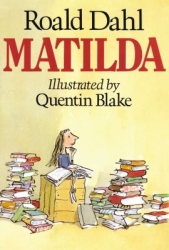
Matilda was one of those books I didn't grow up with. I have no nostalgia for this story, so when I finally got around to listening to the audiobook version, it disappointed me. I know I'm not the intended audience, but what exactly was the lesson being taught here? The main villain was so over the top with her cruelty that I legitimately wondered what Roald Dahl's home life was like when he was growing up. Sure, sticking up for yourself is a great moral, but come on.
I think the biggest issue I had with this book comes down to how they narrated the audiobook. There's the way normal people narrate audiobooks, then there's how people narrate audiobooks for children. The overacting made it difficult to listen to, but not for the reason you'd think. Matilda was such a soft-spoken character that all her lines were whispered. In contrast, all the villainous adults were voiced with shouting. This gave the volume dial on my car whiplash as I kept turning it up to hear what was being said, only to have the narration turn around and blow out my speakers.
As for the plot itself, only one character was likeable. Since everything was from Matilda's point of view, all adults were bumbling buffoons, and all her peers were slobbering idiots. The kind teacher was the only one who gave the precocious child a chance to prove how extremely intelligent she was, but her backstory was so eye-rollingly tragic as to be laughable. Honestly, most of this book felt like I was a witness to child abuse, and that's with its somewhat happy ending.
A too quiet and too loud audiobook about an annoyingly precocious child, I give Matilda 2.0 stars out of 5.
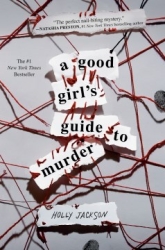
Who was the real killer of Andy Bell? Was it her boyfriend or was it someone you would never think of. Well reading this book was one of the best times I could hardly put it down. I loved how we got to help solve it in away and there was never a mount that u never had something to ask. Like who was the killer? if not who? and why did they do it? There are just so many good things about the book. The only bad thing is you never get sleep cause you can't put it down.
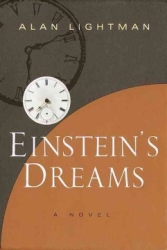
I can appreciate poetic works that try to string each idea together into a connected narrative. I've seen few that have done this as well as Einstein's Dreams has. Of course, the problem with trying to make all these disparate poems work together is that they are still just brief glimpses into stories that could easily stand on their own. Perhaps that's the curse of well-written poetry—it leaves you wanting more. I'd almost consider these stories as writing prompts for anyone looking to make an entire book out of the dreams of the world's best physicist.
Many of the stories in this collection/novel play upon the ideas of general relativity. The way the physics is described and how the people in these worlds live feel legitimately realistic. Of course, sometimes the physics "gimmick" isn't revealed until the end of a story, thus leaving me in the dark as to what was actually happening as I read through the dream. I didn't have enough patience to read through these stories again to fully understand the way their worlds worked.
As a cohesive narrative, there isn't much that advances the story here. It's mostly focused on exploring interesting applications of theoretical physics in the terms of people and their lives. Some are stronger than others, but they're all basically the same idea repeated a couple dozen times in slightly different packaging. And maybe I was expecting something more like Shakespeare in Love (1998) where Einstein's dreams help him break through the concepts he's trying to discover. Instead, the titular character is only in a few pieces of joining text that frame the whole collection. But at least the prose was pretty.
Poetic exploration of theoretical physics, I give Einstein's Dreams 3.0 stars out of 5.
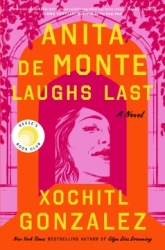
Gonzales is both a non-fiction and fiction writer, whose excellent articles I've read in well-known publications like The Atlantic Monthly. This book is the first novel of hers I've read, and I was not disappointed.
Our two key narrators are Anita, a Latina artist whose husband, we discover right away, killed her in 1980s New York City; and Raquel, a Latina art student in late 1990s Rhode Island, trying to find her way in a predominantly white and privileged community while also maintaining and respecting her cultural roots.
Both Anita (who narrates from the world of the dead and who can use a form of Santeria to manifest her actions and "essence" to people still living) and Raquel share the experience of falling for privileged and self-involved white men, both of whom are controlling and abusive in various ways. While Anita is a fighter to the last, Raquel's self-confidence rises slowly but steadily throughout the novel until the finale when readers see her blossom into a woman who can and will stand up for herself and for her family and true friends.
Beyond the two women's dangerous (and in Anita's case. deadly) relationships with controlling white men, the other linked plotline centers on Anita's art work being gradually erased after her death and the promise that Raquel will somehow unearth those works and breathe new life into them. My only quibble with the progress of this plotline is that its resolution felt rather rushed, not quite providing the satisfaction that a slower, longer narrative of Anita's re-discovery would have.
Gonzales's writing style is propulsive in parts and poetic in others. Her two protagonists are drawn vividly, and even without the named alternating chapters, it would be hard to confuse one voice with another. The conclusion of both narrators' stories shines a light on the importance of women defining themselves outside their roles in men's lives. I think Gonzales also does well to portray Anita and Raquel not simply as victims of male violence and general douche-baggery but as flawed, smart, emotionally conflicted women whose sexual and romantic decisions are as fraught with passion and blind spots as any real-life woman's is.
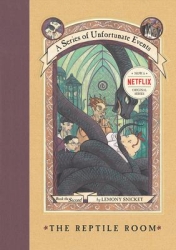
This Reptile Room is a part of a 13 novel series called "A series of Unfortunate events." It’s about the Baudelaire orphans (Violet, Klaus and Sunny) as they live with their reptile-loving relative, Dr. Montgomery. They are trying to outsmart Count Olaf, an evil man trying to steal their fortune while disguised as Uncle Monty’s assistant (Dr. Montgomery, but the orphans call him Uncle Monty). If you enjoy to read mystery books, this book is excellent. I personally don't like books with a slow, boring start because there is nothing that motivates me to keep reading, but the Reptile Room is the complete opposite.
It starts off by stating how Violet, Klaus, and Sunny were orphans because their parents were killed in a house fire which left me having so many questions and made me want to read more. The Baudelaire orphans were put with Count Olaf after the death of their parents, he was an evil man that would do unspeakable things to them and has plans on stealing their fortune they got from their parents. But later, they were sent to live with their distant relative, Dr. Montgomery, but they call him Uncle Monty. Uncle Monty loves reptiles. Uncle Monty plans to take them on a trip to Peru to study snakes. Right when they were experiencing a glance of happiness again, it was shattered. Count Olaf reappears disguised as Uncle Monty's new assistant, Stefano. He is driven by greed and his desire to steal the Baudelaire fortune, he plans to kill Uncle Monty and abduct the orphans. They try to warn Uncle Monty that Stefano is actually Count Olaf but he doesn't believe them and pays the price for it. Despite their best efforts to expose him, the adults around them remain oblivious and the orphans are now forced to continue the struggle against Count Olaf's evil schemes.
Overall, I enjoyed the book very much, and it had great unexpected plots. This book moves at a perfect pace, it doesn't go by too fast but also isn't too slow, there were many new plots and curiosities throughout the book that kept me entertained the whole time. My overall rating for this book was an 8/10, I want to read the following books after this and see what happens to Count Olaf and the Baudelaire orphans.
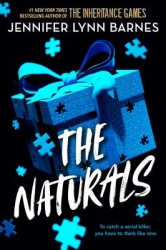
This book is the best YA mystery book I have read in a long time! This book follows a seventeen year old girl named Cassie Hobbes, who had been recruited to work for a Secrate CIA department as a profiler. As a murder starts killing more and more people Cassie and her team start to dig into the case, but as they do, this case starts connecting more and more to Cassie. This is an amazing book and I highly recommend it to anyone who likes mystery.
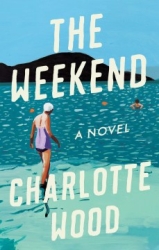
This book by an Australian writer is one of the best novels I've read this year, centering on the lives of four women in their 70s who've known each other for many years. Three of them gather for the duration of the novel to clear out the home of their friend who has died and to know that this place too will no longer be part of their lives. Readers are witness to their struggle to come to terms with their loss and how they will (or won't) continue their now-reduced friendship. The narration toggles easily from one of the (living) women to the next and back, always propelling plot elements even as the narrative voice changes so that the reader isn't getting "re-runs" of several occurrences just because the point of view changes. In addition, each character is sharply defined and unique, so different from each other, in fact, that it's a wonder they were ever friends to begin with. And this narrative tension among the three as they each ruminate on their memories of the absent fourth and chafe against the foibles and flaws of each other felt poignant and, to me, exquisitely realistic.
Many books I've read that I've loved for a good portion have fallen apart or ended on a "bleh" or even a "wtf?" note. Not this time! What will probably stay with me the longest as Wood's admiring reader is the graceful precision of her final depiction of these tough, wise, messy, sad, funny, and unforgettable women. It involves some high drama, for sure, but also, the ocean--and what this small coastal Australian slice of it has meant to all of them.